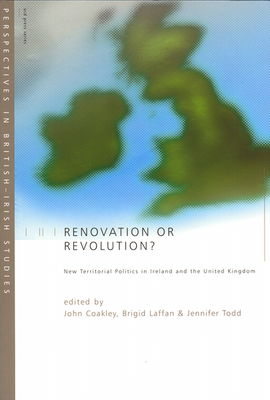Renovation or Revolution
John Murphy reviews Renovation or Revolution: new territorial politics in Ireland and the United Kingdom, John Coakley, Brigid Laffan and Jennifer Todd (eds), University College Dublin Press, £18.95, €25 pbk

THIS IS the third volume in the Perspectives in British-Irish Studies series, in which political science and European studies academics speculate on longterm political changes in what some of them call the "British archipelago", following the good Friday agreement and the setting up of local parliaments in Edinburgh and Cardiff.
Tony Blair contributes a foreword, as Bertie Ahern did to the previous volume. The prime minister says he hopes it will underpin "the progress made as a result of the Good Friday Agreement."
The twelve articles here very much represent official thinking on Anglo-Irish relations and academic commentary thereon. Although they contain useful information they include some rather tedious, and not particularly illuminating, speculation on how these relations can be fitted into different political science "models". Moreover everything is seen in a European Union context, demonstrating the authors' unquestioning belief that the EU will last for ever.
Some key matters could have done with deeper probing. Britain's strategic interest in keeping military bases in Ireland on behalf of NATO during the years of the Cold War are not properly discussed.
One writer points out that in 1975, when Britain engaged in a renegotiation of its terms of membership of the then EEC, the Irish government decided that even if the UK left the EEC following its referendum of that year, the Republic of Ireland would remain in it. This was followed by the decision in 1978 to join the European monetary system without Britain and to adopt the euro-currency even though Britain did not.
In both these cases the Irish government adopted an EU policy that effectively drove a wedge between North and South. Why did this occur, and why did it not cause more concern in the South at the time? Was it because the Provisional IRA campaign had turned large numbers in the South against the notion of national reunification in those years? No real answers are given.
Arthur Aughey of the University of Ulster makes interesting comparisons between Britain as a multinational state and multinational Spain, with its Catalan and Basque minorities, and the multinational Austro-Hungarian empire that fell apart in 1918. Only time will tell whether devolution since 1999 will strengthen the British state or come to be seen as a stage in its eventual disollution.
Referring to academics who are suspicious of the dangerously emotional power of nationality, Aughey gives a useful quote from Roger Scruton: "Political philosophers who conclude that nationhood can be ignored because it cannot be satisfactorily defined often fail to realise that they themselves are relying on it to supply the power and solidarity taken for granted in their theories."
Connolly Association, c/o RMT, Unity House, 39 Chalton Street, London, NW1 1JD
Copyright © 2005 John Murphy

